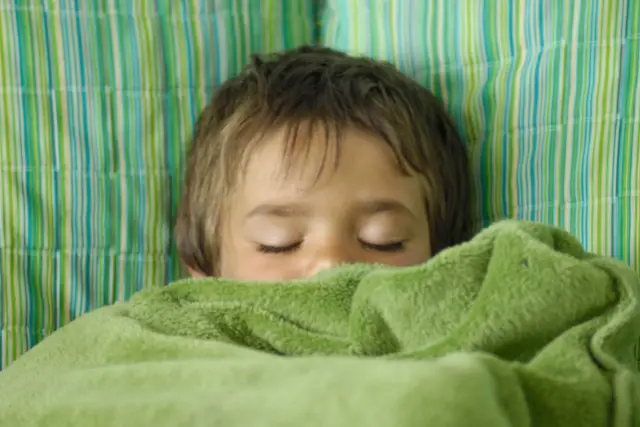Why Would A 4-Year-Old Run Away When Upset?
Running away, hiding, or avoiding the situation is a natural response from 4-year-olds, as their brain tends to send them a message to escape. Children of this age are yet exploring their emotions so they usually don’t know how to express or handle such situations when they feel upset or overwhelmed.
Additionally, some children may have a natural fight response when they feel upset or overwhelmed, and running away can be a way for them to cope with these feelings. This is a normal response and is not necessarily a cause for concern.
As a parent, it is important not to ignore their child if he is developing such coping mechanisms to overcome an unfavorable situation.
In this blog, I have gathered up some possible reasons why your child is running away when he is upset and how to work on such behavior.

Why does my 4-year- old run away when upset?
Running away is a natural response to being upset. Following are the reasons why your 4-year-old might be running away when you want to talk to him.
1- He is seeking attention.
The most possible reason for running away is the child is seeking your attention, whether it be positive or negative. Once your child has discovered that when he runs away with anger, you will follow him to either console him or scold him.
2- He does not know how to control his emotion.
4-year-olds are still in the learning phase of managing their emotions. So when they feel upset, they may not know how to express themselves verbally. Running away could be their way of coping with the situation.
3- He feels scared of the response.
A 4-year-old child may escape when he is upset might be because he feels scared of the response he usually gets from his elders. So he tries to save himself from all the yelling and shouting and finds more peace in running away or hiding for some time.
4- He wants to control his surroundings.
Children at this age newly discover independence so they may try to control their surrounding people. Running away could be a way of showing power over a situation that they feel they have no control over.
5- He has learned it from someone.
Most probably your child has seen someone leaving the room when they are upset. So he may be trying to copy it from his elders to see what will happen next.

This post may contain affiliate links. Read our disclosures here.
What To Do if your 4-year-old runs away when upset?
Well, as we know that it’s a natural response so you don’t have to do much. I would emphasize ensuring that your child is safe and gets his time to understand what’s going on.
Try the following tips to keep him safe and help him regulate his emotions:
1- Create a comfort corner for him:
So, your 4-year-old has a habit of running away or hiding when upset; you must ensure that he doesn’t run away out of the house or lock himself in a room.
The best option is to create a comfort corner for him. You can get a child tent to create a comfortable corner for your little one, like this one in the picture below.

Put some comfort toys such as sensory fidget tubes and books for him to read. Anxiety relief toys are also good options to put there.

You can also decorate it with twinkle lights to make it appealing for the child.
Now, tell him, “This is your corner, you can come here when you need rest or when you are upset. No one else will sit here.”
Your little one will recognize this spot and will want to run to this spot when he is upset which you know is safe. He can take some time to think about his emotions and have some personal and calming space as well.
Check this Kid tent on Amazon. It’s perfect for a 4-year-old. Decorate it with twinkle lights and stuffed toys to make it calming and appealing for your child.

2- Get him story books on how to manage emotions:
Managing emotions is a very important skill that every human being has to learn. You must help your 4-year-old to learn to regulate his feeling.
Storybooks can be a great help to make your little one understand feelings. You can also keep some good storybooks in your child’s comfort corner.
4-year-olds love to learn things through reading and pictures. I have some suggestions for books that can teach your child how to manage his emotions:
The Bad Seed

The bad seed by Jory john is the story of a very bad seed who went really bad due to some life events but when he realized that he does not have control over his emotions he decided to change for the betterment. This storybook is a good pick for your 4-year-old who is currently having a tough time managing his emotions.
Click here to get “The Bad Seed” storybook on Amazon.
Inside Out Box of Mixed Emotions

Inside out a box of mixed emotions is a good pick for your child if he is a fan of Disney movies. This box comes with 5 little books and each one of them is designated for one emotion. The words are simple and the stories are short and illustrative. Each book explains the emotion and how it reacts in it.
Click here to get “inside out box of mixed emotions” on Amazon.
I’m Just a Kid: A Social-Emotional Book about Self-Regulation
I’m just a kid by Chandelle Morris is a great tool to help little ones learn how to regulate their emotion in the best way. This book has a character who doe snot know how to manage his emotions and how he suffered due to it. But when he learned how to regulate his emotions, he becomes a happy kid.

Click here to get “I’m Just A Kid” storybook on Amazon.
3- Acknowledge and validate his feelings.
The first and most important step is to acknowledge your child’s feelings. Let him know that you understand how they feel. Use simple and consolable words so that he feels safe and expressable in front of you.
For example, say “I can see that you’re feeling upset right now,” or “I understand that you’re feeling angry because you can’t have what you want.”
By such words, he would get assured that his feelings have been validated and understood.
4- Be supportive and offer comfort.
I know it is easier said than done, but offering comfort like a hug or holding hands can soothe an angry or upset child. Because when is comforted, he feels safe and secure and also learns that his parents are concerned for him.
5- Talk to him gently.
Speak to the child calmly and politely. A soft tone and soothing voice would give him the courage to speak about his feelings. Avoid crossing your arms or appearing tensed or frustrated, it will make him run even more.
6- Listen to his point of view with full attention.
Leave everything aside when your child starts to express his feelings. Give him full attention and address his issues calmly yet firmly if he is asking for something he can’t have for that moment.
If you are saying “No” to anything, be firm on your decision rather than giving him what he was asking for to avoid running away or hiding. This act will make the child more stubborn and he will most likely react the same way whenever he wants something done his way.
7- Work on his problem-solving skills.
Whatever the situation may be, you can help your child to solve the problem instead of running away from it. Ask him what he thinks he can do to make the situation better, consider his options and alter it in a way that he thinks you are listening to his opinions. Guide, support and help him to solve his own problems.
8- Ask him to express his feelings in words, not by actions.
Encourage him to express his feelings in words, not by actions. Tell him that running away or hiding when upset will make him more frustrated. Ask him to rather sit and express what he is feeling.
You can also ask him to draw what he is feeling, some children are way expressive when it comes to arts.
9- Redirect his attention.
I know addressing a 4-year-old’s problem the whole day is not possible, especially with a child who gets upset many times a day. Sometimes it is better to ignore and redirect his attention instead of addressing it.
10- Focus on how you as a parent react when upset.
Closely watch your and your partner’s behavior when you guys get upset on any matter. If anyone of you is behaving irrationally, your child will end up reacting to situations like you.
Also, see if someone around him does the same, maybe a friend, a cousin, or grandparents.
Conclusion:
It is a natural response for a 4-year-old to run away when upset. Some kids also prefer hiding. As long as he isn’t overly aggressive, it’s not a cause for concern. But ensure that he doesn’t run away from the house or lock himself in a room.
I think the best practice is to create a “comfort corner” for him where he can hide when he is upset. Stress relief toys and books will help to calm him down.
Click here to purchase the tent.








